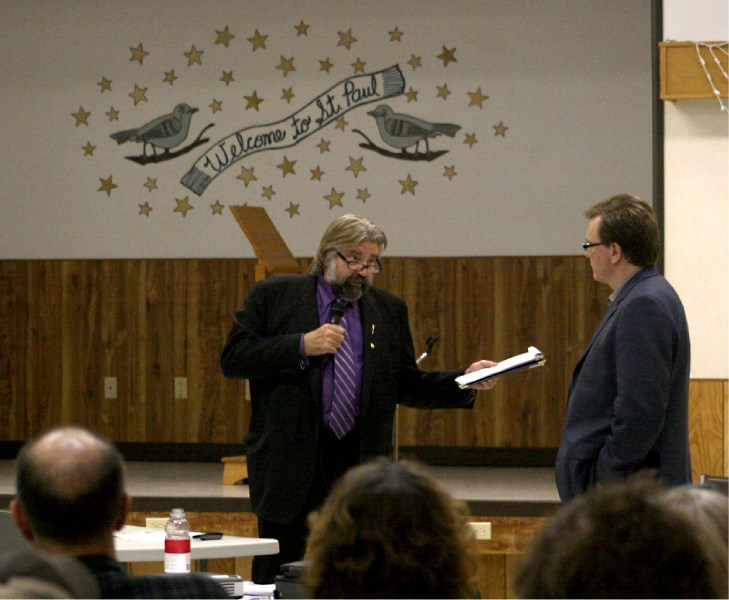Keith Wilson’s public speaking tour of the province continued in St. Paul last week at the St. Paul Senior Citizens Centre, with an unexpected twist not found at any of his previous 27 information meetings on land use laws.
Local MLA and Minister of Infrastructure Ray Danyluk achieved the distinction of being the first member of government to attend one of Wilson’s meetings.
After his presentation, Wilson invited Danyluk to respond, sparking a 45-minute debate over land use legislation passed by government in 2009. In Danyluk’s rebuttal, he said it would take considerable time to rebut “misleading” analogies stated “for political purposes.”
The purpose of the legislation was to deal with rapid development, he said.
“We needed to balance land uses, we needed to protect the rights and freedoms of private landowners.” The law gives additional rights and does not take away rights, he said, an argument Wilson called “nonsense” in his presentation.
Danyluk defended former Bill 19, the Land Assembly Project Area Act, which falls into his portfolio as minister. The law allows current uses to continue on land frozen by government for a public project, he said.
Under the bill, there is no entitlement to compensation after a tract of land is frozen, Wilson replied.
In the cases of ring roads around Calgary and Edmonton, the freeze lasted 30 or 40 years, Wilson said in his presentation. The act allows government to work around the Expropriation Act, he said.
County of St. Paul resident Valerie Pratch organized Wilson’s talk in St. Paul and was motivated by Wilson’s message she heard at a previous meeting.
“We all need to find out the information and we all need to make decisions accordingly,” she said after the meeting. “We’re going to lose things that our fathers and grandfathers fought for us if we don’t stay attuned to what’s going on.”
Wilson’s presentations have critiqued four laws, the Alberta Land Stewardship Act, the Electric Statutes Amendment Act, the Land Assembly Project Area Act, and the Carbon Capture and Storage Act.
“The common theme is, cabinet knows better … limiting and removing entitlements to compensation, and reducing proprietary rights,” he said after the meeting.
Wilson took aim at the Electric Statutes Amendment Act, former Bill 50, in his presentation, calling it a massive overbuild of transmission lines that industry groups and think tanks oppose.
The St. Albert lawyer pointed to a leaked letter from Alberta Direct Connect (ADC) and the Industry Power Consumers Association (IPCAA) to government written in October 2010, that said plans would put Alberta’s competitiveness at risk.
“We simply cannot afford this transmission development plan and it is unnecessary,” said the letter signed by Colette Chekerda, executive director with ADC, and Sheldon Fulton, IPCAA’s executive director.
Industrial manufacturers would be at risk of going out of business with the increased price of electricity, Wilson said. The price of electricity would triple, he said.
The cost would increase, but only $3.50 to $4 a household, said Danyluk after the meeting. The cost of the lines would be determined by the Alberta Utilities Commission (AUC), he said, adding that he has faith in the Alberta Electricity System Operator (AESO) view on the need for new lines.
“We are paying for the ability to have power transported throughout this province,” he said of the cost of new lines after the meeting. “There is no business that can stay alive in this province or anywhere else if they’re not reimbursed for their investment.”
“It is my responsibility as minister … to ensure we don’t have blackouts.”
With the growing population, more power will be needed, he said.
Industry may be talking about leaving the province, but it’s not happening, he said during the debate with Wilson.
Contrary to what government is saying, transmission lines are not like schools, highways, and hospitals because they are paid for by taxpayers but are owned by the utility company, said Wilson.
“There’s a natural incentive for sometimes lines to be proposed when they’re truly not needed,” he said in his presentation.
The legislation of former Bill 50 replaces the “check and balance” role of the AUC, he said, which can turn down proposed lines, with a cabinet decision.
Danyluk speculated industry groups opposed to the proposed transmission lines would benefit from the proposed transmission lines not being built after the meeting, something Wilson disputed by saying that the industry groups that have opposed the lines do not produce power.
The oil and gas, petrochemical, forestry, agricultural food processing industries are not interested competing with electricity system, Wilson said.
While Fort McMurray oilsands operations put power on the grid with co-generation facilities, the province needs the ability to produce power and transmit power to Fort McMurray in case the regional municipality is using all of its power, Danyluk said.
Right now the amount of power is higher than Fort McMurray needs, but maybe they’ll need that power in the future, he said.
There is time as the economy fluctuates to “do it properly” as power needs change, Wilson said, adding that the recent AESO study shows the grid is stable.
“To me the debate is over, the question is, when is the government going to do the responsible thing, listen to our major employers, listen to the major drivers of our economy and keep us competitive,” Wilson said after the meeting.



